The game's global presence: Several international players reflect on their paths to college fooball
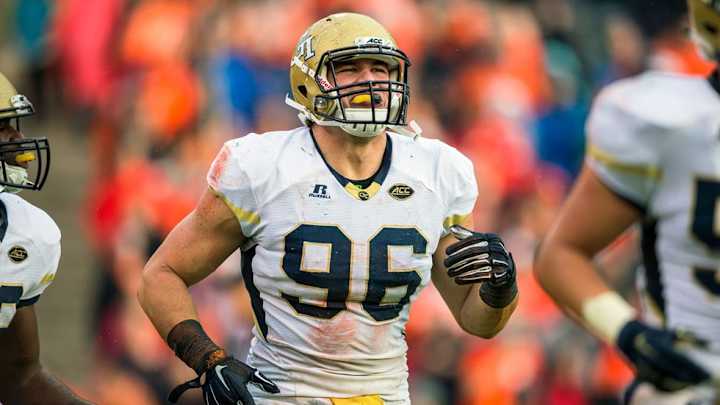
When Adam Gotsis was a child, college football was a foreign concept. The sport was relatively unknown in Gotsis's hometown of Abbotsford, Australia; he could name a few NFL teams offhand, but the Aussie never watched American football during his upbringing. The college version of the game was a complete mystery.
That changed when Gotsis was about 14. One day his older brother, Peter, showed him a YouTube clip of the 2006 national championship game between Texas and USC. The younger Gotsis watched in awe as Longhorns quarterback Vince Young scored his iconic, last-second touchdown. Now a senior defensive tackle at Georgia Tech, Gotsis remembers the pageantry and gravity of the moment as leaving him hooked. "I watched it and I was like, this sport would be insane to play," he says.
He eventually achieved that dream. Gotsis is one of several international players to find a place on a college football roster. And the number of global success stories keeps growing by the year: Berlin, Germany, native Bjoern Werner starred for Florida State before going to the Indianapolis Colts as a first-round NFL draft pick in 2013; offensive tackle Menelik Watson grew up in Manchester, England, before playing for the Seminoles in '12 and then joining the Oakland Raiders; punter Brad Wing lived in Melbourne, Australia, prior to having a standout career at LSU from 2010-12 and later becoming a member of the New York Giants.
As the sport continues to expand its footprint, this much is clear: No two players' journeys are exactly alike.
*****
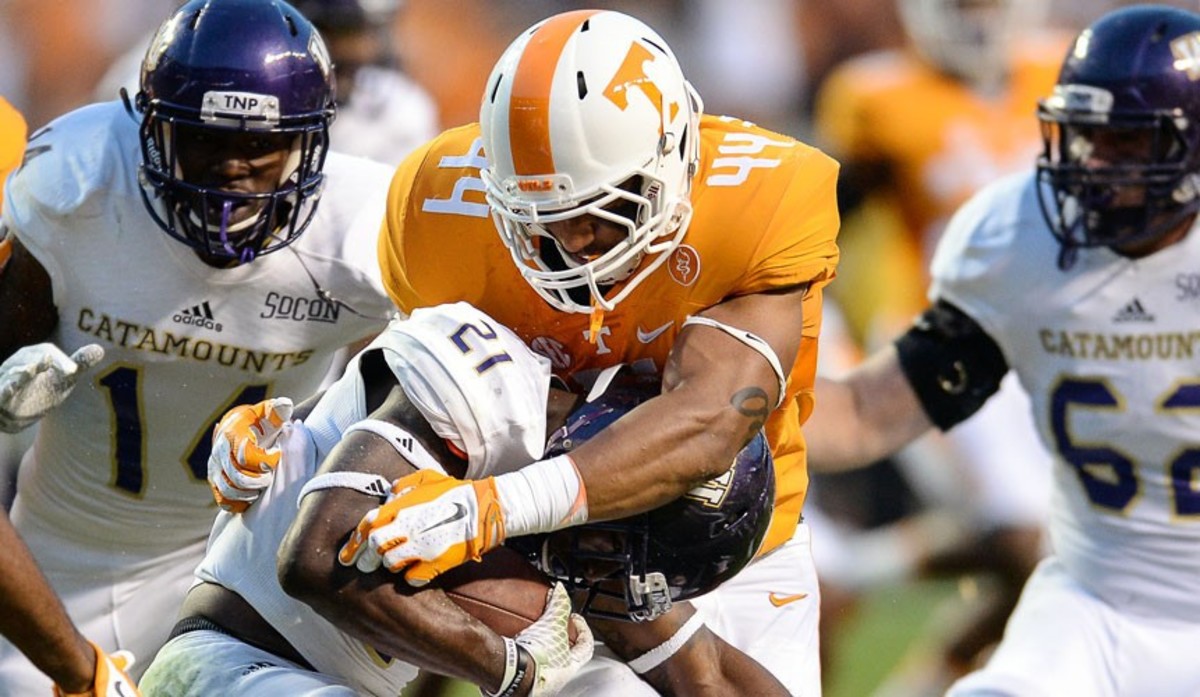
Icon Sportswire via AP Images
Jakob Johnson's mother needed a way to keep him out of trouble. Football was the answer. "It was really just my mom trying to find a sport that would take all my excess energy out," says Johnson, a sophomore linebacker turned tight end at Tennessee. Growing up in Stuttgart, Germany, Johnson tried a number of sports, from wrestling to soccer to swimming. But it wasn't until he joined a German club football team, the Stuttgart Scorpions, that one became a serious part of his life.
Johnson had the pedigree to excel on the gridiron; his dad, Calvin, had also played for the Scorpions. But the younger Johnson knew little about the game. He learned the basics from playing Madden and NCAA Football on PlayStation, and he dreamed of one day playing college football. As he began to excel for the Scorpions, Johnson went to Wikipedia and compiled a list of every FBS program in the U.S. He scoured schools' websites and sent emails to as many defensive coordinators, linebackers coaches and recruiting coordinators as he could find. "It took me a long time," Johnson says, adding he received no more than three responses.
That process taught Johnson the details of qualifying for an American university. He soon realized playing high school football in the states represented his best shot at landing a scholarship. So, Johnson moved in with relatives in Jacksonville, Fla., for his senior season, where he played for Jean Ribault High. In just one season in the U.S., Johnson recorded 112 tackles, including 15 for loss along with six sacks. Schools like Wisconsin and UCF offered scholarships, while Florida State and Miami showed local interest. But Johnson chose Tennessee because his primary recruiter, linebackers coach Tommy Thigpen, extended a scholarship offer during their first face-to-face meeting. That confidence sold Johnson on the Volunteers.
Once Johnson arrived on campus, he had to adjust to a new way of life. He used to borrow or purchase his own equipment as a member of the Scorpions; Johnson's favorite football helmet, he estimates, dated back to 1994. At Tennessee, Johnson's equipment is always state of the art. He took time to adjust to the SEC fans, too. The Scorpions rarely played in front of crowds larger than 300 in Stuttgart. Johnson left his first game at Neyland Stadium in awe of 100,000 fans in attendance.
Football was hardly a priority for Johnson's German club: He used to practice only three times a week for 90 minutes each. Now, he is able to fine-tune his game in hopes of going on to play professionally, either in the NFL or elsewhere. Most of his teammates back in Stuttgart led very different lives. "I had people on my team in Germany who were already graduated and working real, full-time jobs, like electricians," Johnson says.
Off the field, Johnson continues to acclimate to his surroundings. He has improved his English, though his accent still confuses teammates in huddles. Early on Johnson realized that he needed to get a grasp on American slang, so he binge-watched episodes of Family Guy. He has also embraced the food offerings near the Knoxville campus, like the cheesesteak at Gus's Deli and a 12-pack of cheeseburgers at Krystal.
Johnson sometimes struggles to accurately describe college football to friends back home. But crazed soccer loyalists in Europe typically serve as a point of reference. "Here in the SEC, everybody's a football fan," Johnson says. "The mom, the dad, the kids—everybody is hardcore. In Germany, it's more like 20- to 30-year-old men. Here in America, it's a family thing. There's no age limit."
*****
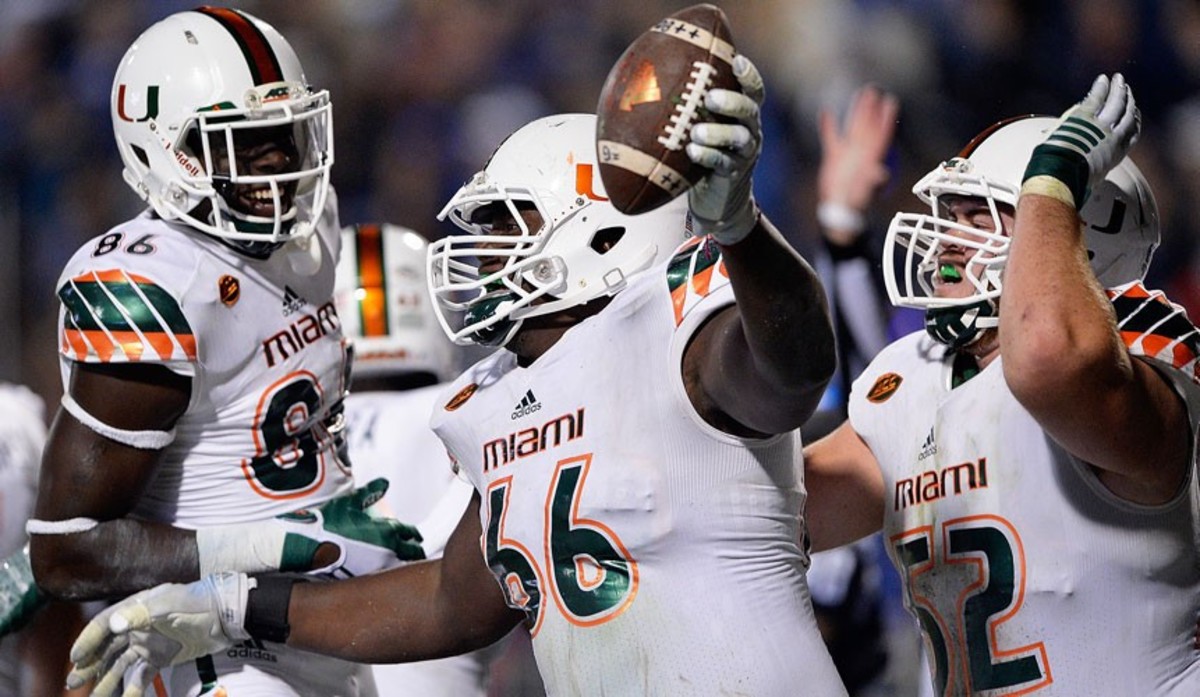
Grant Halverson/Getty Images
The hometown of Miami offensive tackle Sunny Odogwu isn't really a town, per se. It's more of a village. The redshirt sophomore hails from the rural Ezeagu, Nigeria, a 250-square-mile local government area of the nation's Enugu State. Despite living in Ezeagu for the first 16 years of his life, Odogwu can't always put his former home in context. "I'll put it this way: It's like going into West Virginia, driving deep inside the woods and going off road until you stop seeing the developed side," Odogwu says.
The youngest of seven siblings—he has three brothers and three sisters—Odogwu grew up in a small, one-room house no bigger than 10' by 10' that lacked electricity. His mother and father shared the only bed, while he and his siblings slept on the floor. As he grew, Odogwu, who now stands 6' 8" and 320 pounds, could no longer fit in his family home. So, he started sleeping outside.
Odogwu soon found a calling in basketball. He used his massive frame to post up and punish friends in pickup games, and by age 15 he was dunking with ease. At 16 Odogwu attended a local basketball camp hosted the Ejike Ugboaja Foundation. Ugboaja is a Nigeria native and a former second-round pick in the 2006 NBA draft. At the camp, coaches from Victory Christian Academy in Conyers, Ga., took notice of Odogwu's size and skill. They offered him a chance to go to prep school in America and play basketball.
At first, Odogwu was hesitant. His father had passed away that same year, so he questioned leaving his family behind. But Odogwu also realized his opportunities— athletically and beyond—were limited if he stayed where he was. He decided to come to America. "I was like, O.K., God, you want me to do this?" Odogwu says. "I told my family, this is happening to me, so I'm going."
Odogwu spent one year at Victory Christian before going to renowned Huntington Prep in West Virginia. He developed a reputation as a bruising defender, almost to a fault. "By the second half of games, I'd already have like three or four fouls," Odogwu laughs. Coaches often joked that his physical style would translate better to football. So, Odogwu transferred to St. Frances Academy in Baltimore, where he played his first game on the gridiron as a senior in high school.
Odogwu graduated from St. Frances and then spent one season at Hargrave (Va.) Military Academy. He committed to Miami in December 2012, when his on-field education truly began. "I didn't know the game until I got to the University of Miami," Odogwu says. Before college, he had relied on his brute strength to succeed on the field. But he took to coaching immediately, honing in on the game's fundamentals.
This August, Odogwu entered the season as the Hurricanes starting right tackle. The business management major plans to graduate in May and enter the school's MBA program. Odogwu can now envision a future he never would have dreamed of in that one-room Nigerian house. "Where I'm from, I don't know how I got here," he says. "If it's not God, then I don't know what it is."
*****
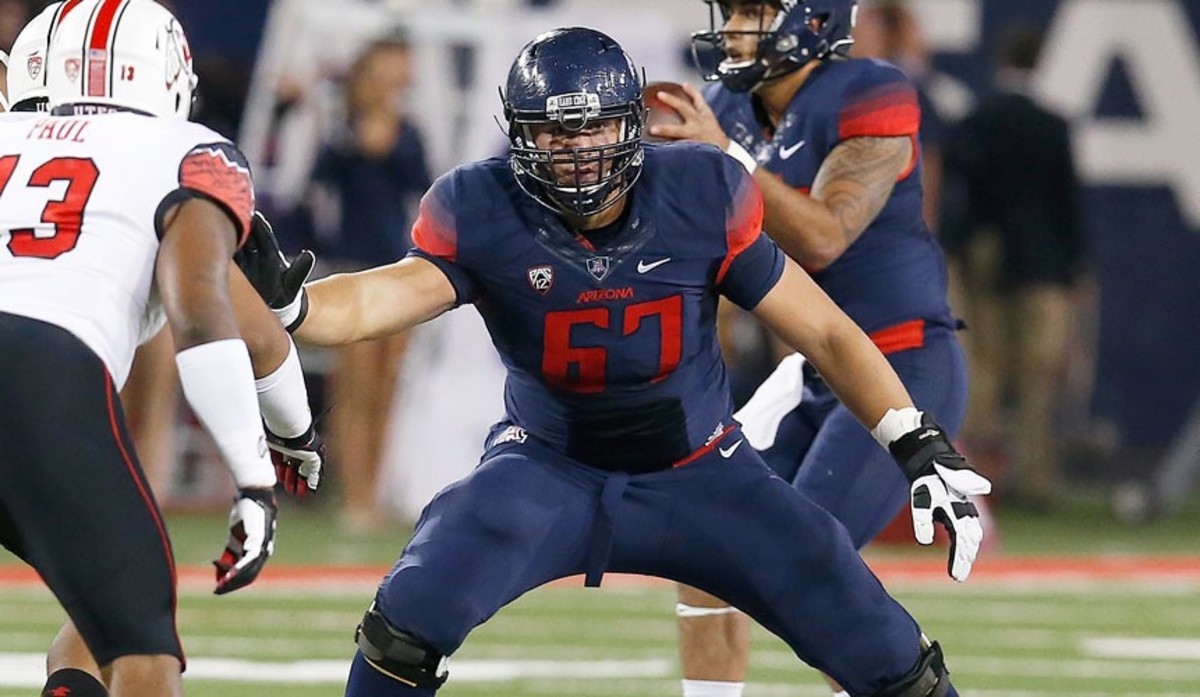
Rick Scuteri/AP
Just when Gerhard de Beer starts to feel at home at the University of Arizona, he gets a wake-up call of sorts. One of his teammates, redshirt junior left tackle Freddie Tagaloa, likes to mock the 6' 7", 290-pound offensive lineman's thick South African accent.
"Every time I say something, he repeats it," de Beer says. "But I swear I don't sound like the way he says it."
While de Beer's drawl might not fit in around Tucson, he otherwise has embraced his surroundings during his three years at Arizona. The South Africa native grew up playing rugby and came to the U.S. on a track and field scholarship after a prolific high school career. He attended Afrikaanse Hoër Seunskool in Pretoria, and he won bronze medals in discus at the 2011 World Youth Games and the 2012 World Junior Track and Field Championships.
De Beer found his way to Arizona at the junior championships in Barcelona, where he met former Wildcats track assistant Craig Carter, who recruited the bulky South African to the Pac-12. The idea of trying football likewise intrigued de Beer. The sport had very little presence in his home country—"Rugby is so dominant, there's no room for that to grow at all," de Beer says—and most of his knowledge came from watching clips on YouTube. But de Beer remembered a story he'd heard from his cousin, Simone du Toit, a former thrower on SMU's track team. Du Toit told of her Estonian teammate Margus Hunt. Hunt, who threw discus and shot put, found his way on to the SMU football team, and now he plays defensive end for the Cincinnati Bengals.
De Beer wondered if he could follow a similar path. During his recruitment Carter assured de Beer the door was open to play football. Soon after de Beer arrived in Tucson ahead of the 2013 season, Carter stopped by the Arizona football offices. The coach told Rich Rodriguez he had a 6' 7" thrower who was a star in the weight room and wanted to walk on. The Wildcats opted to give him a shot.
While earning All Pac-12 honors in discus in each of the last two seasons, de Beer has developed an affinity for football. He transitioned from the defensive line to tight end before settling along the offensive line. He started from scratch in learning the basics of the game; de Beer studied detailed clips of different pass rushes online. He even credits his rugby background with helping him adjust to college football.
"Rugby's an all-around thing, you know," de Beer says. "You need to learn to throw the ball, catch it, kick it, run with it. It's all those fundamental things that help me do what I'm able to do right now."
Like Hunt, de Beer has dreams of reaching the NFL only two years after knowing very little about the sport. But even if a professional career doesn't materialize, de Beer remains thankful for the opportunity to play major college football. "It's been really fun," he says. "It really opens a whole new world up for you, in terms of people you get to know and things you get to learn."
*****
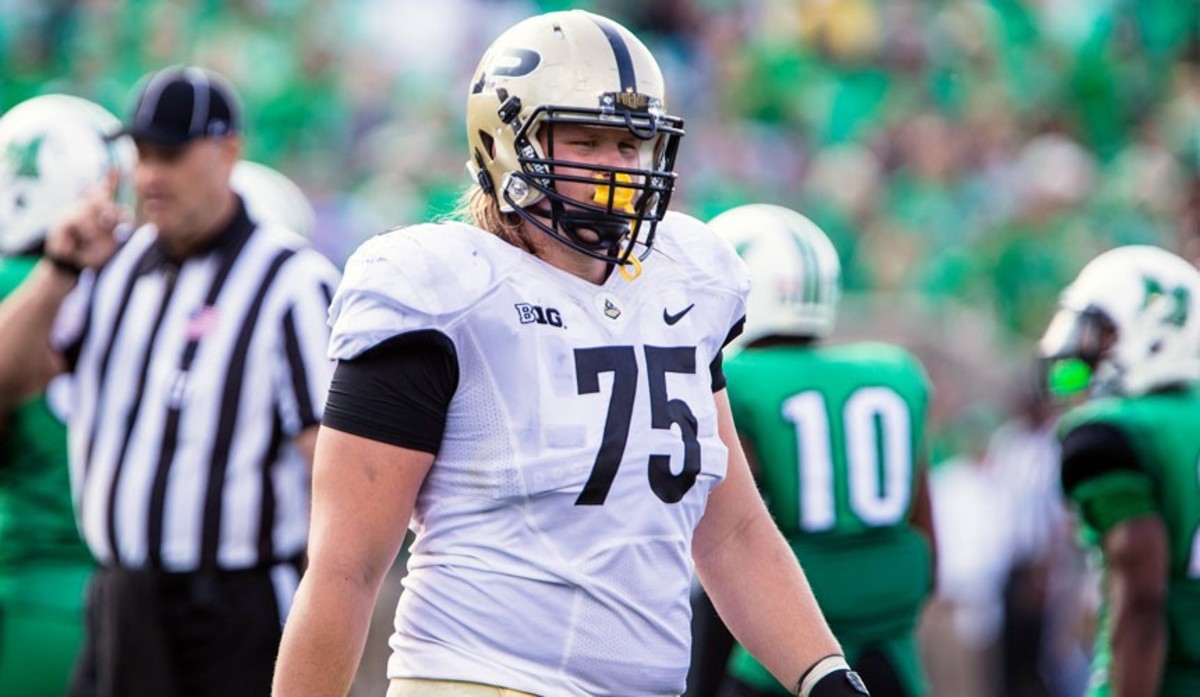
Icon Sportswire via AP Images
Six months before David Hedelin arrived in the U.S., he spent most of his time bottling wine. That was one of the Purdue offensive lineman's many tasks as a worker on his family's winery in Argentina. A native of Stockholm, Sweden, Hedelin and his parents moved to Argentina after he graduated high school so they could maintain a winery they had overseen from afar for five years.
Now, Hedelin plays left tackle for the Boilermakers. The senior has lived in four countries and is fluent in three languages, and he has experienced sports culture in several pockets of the globe. To Hedelin, college football fans aren't the rowdiest of the bunch. "I think the fans here are way friendlier," Hedelin says. "In Europe I feel like people just want to fight."
Hedelin grew up primarily playing soccer but dove into American football in high school. After graduating, his family moved to Argentina, and Hedelin traveled back and forth to Stockholm to continue playing for his Swedish club team. When he turned 21, his family uprooted again and moved to Spain. Hedelin joined a Spanish club team and dedicated his time to working out, hoping to catch a break with his football career.
One day Hedelin received a Facebook message from a Swedish player he didn't know who played on the offensive line at City College of San Francisco. "In Sweden the football is so small, all the good players know of each other," Hedelin says. His fellow countryman told Hedelin to move to America and join his team. That was the opportunity for which Hedelin had been waiting. Within two weeks, he found himself in California.
After two seasons spent at a junior college, Hedelin fielded 34 FBS scholarship offers. But the NCAA slapped him with a one-year suspension stemming from his stint playing club football in Spain, which took place after the allowed two-year grace period following high school graduation. As news of Hedelin's suspension spread, schools began to lose interest. Hedelin, who initially committed to Michigan State in December 2013, eventually chose to go to Purdue because the school worked with the NCAA to whittle his suspension down to three games.
His choice has paid off. In 2014 Hedelin started seven games at left tackle. The 6' 4" lineman says he has gained 65 pounds since his senior year of high school and is more physical than ever. He has also learned plenty about college football's culture. "It's still a little confusing with all the conferences and all that," he says. "When I wasn't living here, I didn't know a thing about the SEC, the Big Ten, the Big 12. It's a lot."
It's also a long way from bottling wine.
*****
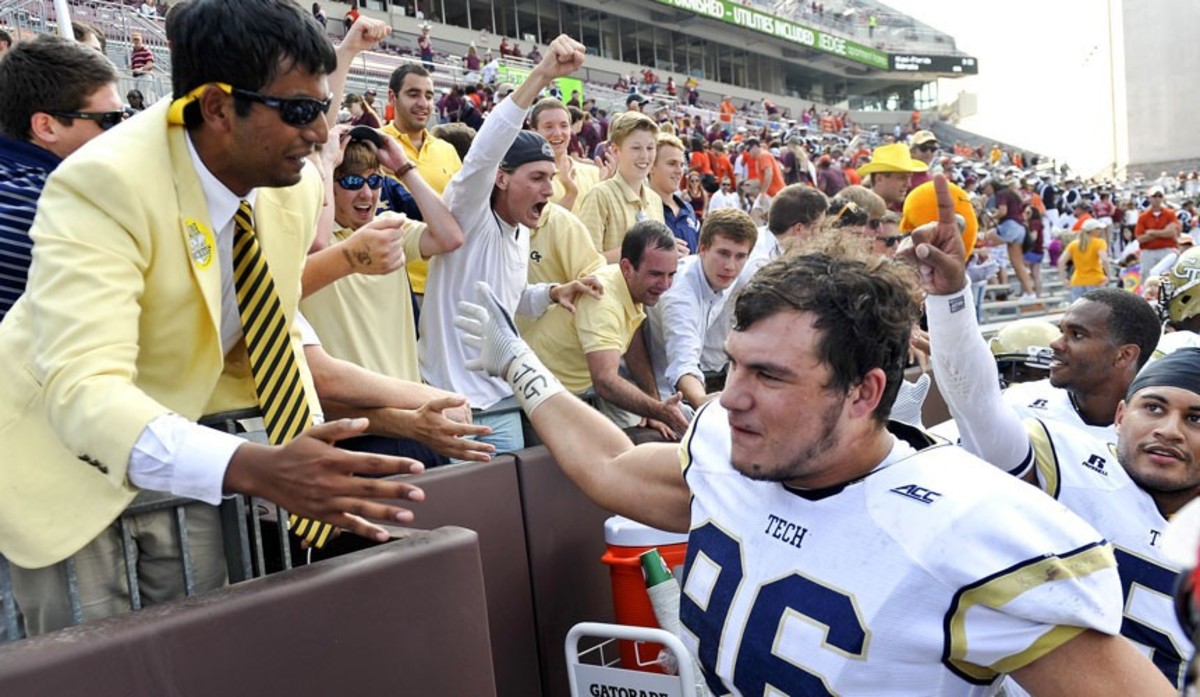
Michael Shroyer/Getty Images
Adam Gotsis played rugby in Australia, but he also took part in club football as a member of the Monash Warriors in Gridiron Victoria, an Australian league that plays by American football rules. He describes it as a recreational league: The club required a registration fee and an additional $50 for insurance, while players wore used shoulder pads and helmets that needed to be returned at the end of the year. "That's pretty strange when you come to Georgia Tech and go into the whole equipment staff and be like, oh, I want that facemask this week," Gotsis says.
Gotsis's path to the U.S. began when he caught the eye of Paul Manera, a fellow Australia native who had played on the offensive line at the University of Hawaii from 1989-91. Now Manera helps connect Australia's top football prospects with college coaches in the states. At Hawaii Manera had played for current Georgia Tech coach Paul Johnson, who then served as the Rainbow Warriors offensive coordinator. Manera touched base with Johnson and recommended Gotsis to the Yellow Jackets. Eventually, Johnson lured the Aussie to Atlanta for an official visit, and Gotsis committed to Georgia Tech in January 2012.
Gotsis felt a few growing pains as he adjusted to being away from Australia, where he is close with his older brother, older sister and twin younger sisters. But this year Gotsis's parents, Louis and Doxy, rented an Atlanta apartment so they could witness their son's senior season. Gotsis's younger sisters even came along and live with him in his apartment. This season they all watched Gotsis play in person after previously having to wake up at 3 a.m. to live-stream Georgia Tech's games in Australia.
Gotsis enjoys introducing his parents to the parts of American culture he has come to love. Before his family arrived, Gotsis spent several Thanksgiving meals with his teammates, learning the ins and outs of a holiday dinner tale. "We don't have mac and cheese with every single meal in Australia," Gotsis says. "In the South, it's pretty much a staple." An emphasis on soul food hasn't soured Gotsis on American dining, however; Chick-fil-A and Chipotle are two of his favorite restaurants. And what about Outback Steakhouse? "It's nothing I couldn't whip up on the barbecue back home," he jokes.
Gotsis saw his college career come to an end when he suffered a knee injury in a 27–21 loss to Virginia on Oct. 31. He hopes to vie for a roster spot in the NFL, but no matter what lies ahead, Gotsis never questions his choice to play football. After all, the locker room at Georgia Tech soon grew into his second home.
"I left a family of seven" Gotsis says, "and came here and gained a family of 120."
